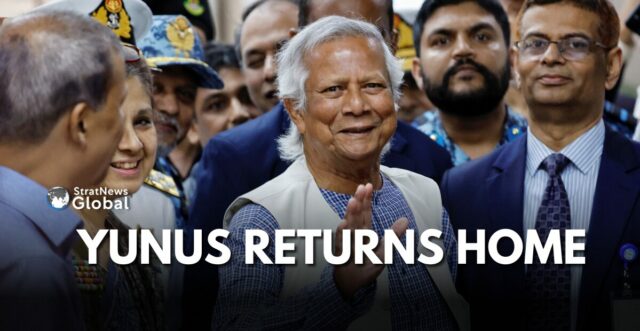Nobel Peace laureate Muhammad Yunus returned to strife-torn Bangladesh on Thursday to lead a new interim government. His return follows weeks of student protests that forced Prime Minister Sheikh Hasina to resign and flee to neighbouring India.
Yunus’ Arrival And Role
Yunus, 84, arrived in Dhaka after medical treatment in Paris. Greeted by top military officers and student leaders, he expressed his gratitude and commitment. “I feel good coming back home,” Yunus said at the airport. He praised the student protesters for saving the country and emphasised the need to protect this newfound freedom. “Whatever path our students show us, we will move ahead with that,” he added.
Yunus is set to be sworn in as chief of a team of advisers at 1430 GMT at the official residence of President Mohammed Shahabuddin. His task is to lead the country towards elections for a new leader.
Political Turmoil And Hasina’s Exit
Hasina’s Awami League party does not feature in the interim government following her resignation on Monday after weeks of violence that killed about 300 people and injured thousands. Hasina, who ruled Bangladesh for 20 of the last 30 years, fled to an air base near New Delhi, India.
Despite her dramatic exit, Hasina’s son, Sajeeb Wazed Joy, stated on Facebook that the party had not given up and was open to talks with opponents and the interim government. “I had said my family will no longer be involved in politics but the way our party leaders and workers are being attacked, we cannot give up,” he said.
Yunus’ Legacy And Immediate Challenges
Yunus, known as the “banker to the poor,” received the 2006 Nobel Peace Prize for founding a bank that fought poverty through small loans to needy borrowers. His return to lead the interim government marks a significant moment in Bangladesh’s political landscape.
Hasina’s exit triggered both jubilation and violence, with crowds storming and ransacking her official residence unopposed. This unrest reflects deep-rooted dissatisfaction with her rule and the harsh economic conditions and political repression that fuelled the protests.
The Path Ahead
The student-led movement that ousted Hasina began as protests against quotas in government jobs but escalated in July, leading to a violent crackdown that drew global criticism. The interim government’s immediate task is to stabilise the country and prepare for fair and transparent elections.
As Yunus steps into his new role, the international community and the people of Bangladesh will be watching closely to see how he navigates this period of transition and works towards a peaceful and democratic future.
(With Inputs from Reuters)
Research Associate at StratNewsGlobal, A keen observer of #China and Foreign Affairs. Writer, Weibo Trends, Analyst.
Twitter: @resham_sng





